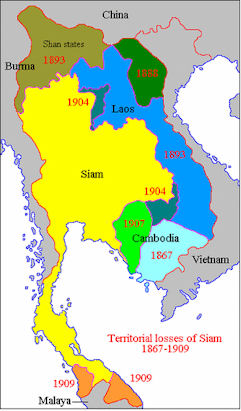

Zitierweise / cite as:
Payer, Alois <1944 - >: Chronik Thailands = กาลานุกรมสยามประเทศไทย. -- Chronik 1839 (Rama III). -- Fassung vom 2016-11-23. -- URL: http://www.payer.de/thailandchronik/chronik1839.htm
Erstmals publiziert: 2013-07-01
Überarbeitungen: 2016-11-23 [Ergänzungen] ; 2016-01-06 [Ergänzungen] ; 2015-09-09 [Ergänzungen] ; 2015-05-09 [Teilung des Kapitels] ; 2015-05-08 [Ergänzungen] ; 2015-04-22 [Ergänzungen] ; 2015-03-16 [Ergänzungen] ; 2015-03-04 [Ergänzungen] ; 2015-01-24 [Ergänzungen] ; 2014-12-15 [Ergänzungen] ; 2014-11-13 [Ergänzungen] ; 2014-11-04 [Ergänzungen] ; 2014-10-27 [Ergänzungen] ; 2014-09-21 [Ergänzungen] ; 2014-08-20 [Ergänzungen] ; 2014-03-26 [Ergänzungen] ; 2014-03-08 [Ergänzungen] ; 2014-02-26 [Ergänzungen] ; 2014-01-13 [Ergänzungen] ; 2013-12-20 [Ergänzungen] ; 2013-12-05 [Ergänzungen] ; 2013-11-25 [Ergänzungen] ; 2013-11-05 [Ergänzungen] ; 2013-10-11 [Ergänzungen] ; 2013-09-28 [Ergänzungen] ; 2013-09-23 [Ergänzungen] ; 2013-09-17 [Ergänzungen] ; 2013-09-02 [Ergänzungen] ; 2013-08-23 [Ergänzungen] ; 2013-08-21 [Ergänzungen] ; 2013-08-14 [Ergänzungen] ; 2013-08-11 [Ergänzungen] ; 2013-07-13 [Ergänzungen] ; 2013-07-10 [Ergänzungen] ; 2013-07-08 [Ergänzungen]
©opyright: Dieser Text steht der
Allgemeinheit zur Verfügung. Eine Verwertung in Publikationen, die über übliche
Zitate hinausgeht, bedarf der ausdrücklichen Genehmigung des Herausgebers.
Dieser Text ist Teil der Abteilung
Thailand von
Tüpfli's Global Village Library
ช้างตายทั้งตัวเอาใบบัวปิดไม่มิด
|
Gewidmet meiner lieben Frau Margarete Payer die seit unserem ersten Besuch in Thailand 1974 mit mir die Liebe zu den und die Sorge um die Bewohner Thailands teilt. |
|
Bei thailändischen Statistiken muss man mit allen Fehlerquellen rechnen, die in folgendem Werk beschrieben sind:
Die Statistikdiagramme geben also meistens eher qualitative als korrekte quantitative Beziehungen wieder.
|
1839
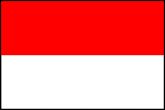
Älteste erhaltene Handschrift des Hikayat Patani (حكاية ڤتاني).
Abb.: Einbandtitel einer modernen Ausgabe mit Übersetzung
Abb.: Lage von Patani (كراجأن ڤتتاني )
[Bildquelle: Bartholomew, J. G. <1860 - 1920>: A literary & historical atlas of Asia. -- London, o. J.]
"The Hikayat Patani, meaning Story Of Pattani, is a semi-legendary set of tales that chronicle the history of the Pattani kingdom (كراجأن ڤتاني / อาณาจักรปัตตานี), now a southern state of Thailand. These stories date to as early as the late 1400s, but were most likely first recorded at various times between 1690 and 1730 by as many as six different authors (the sections outlined below were first established by linguist Andries Teeuw (1921 - 2012) and historian David K. Wyatt (1937 - 2006)) and written in Jawi alphabet (جاوي).
The story survives in a number of original manuscripts, the earliest transcribed by Abdullah Menshi in 1839, and held in the Library of Congress.
SectionsPart One: Stories of the Inland Dynasty The first section, which includes pages 1–74 of the 1839 manuscript, details events during the reign of the Inland Dynasty, which ruled Pattani from its foundation, as early as the mid-fourteenth century, until its fall in the Seventeenth century. The tales are essentially an account of the rajas, in succession. No explanation is given for the emergence of the tradition of female rulership, so one must assume the authors of the chronicle thought the matter irrelevant.
Part Two: Stories of the Kelantan Dynasty This section, comprising pages 74–78 in the 1839 manuscript, tells of the rise to power of Raja Bakal and the succession of kings until the fall of Alung Yunus. These stories possess a style that indicates the authors were contemporary to the events they describe. Once again, the stories concentrate on the deeds of the rulers of Pattani, though this section is filled with the succession conflict and declining economic realities evident in the region after 1688. Two dates are given for the rulers below, the first based upon Teeuw & Wyatt's chronology and the other from al-Fatani (see references below).
Part Three: Bendaharas of Pattani This section gives a brief account of the bendaharas (prime ministers or royal treasurers) who served the rulers of Pattani.
Part Four: Datuk Cerak Kin This story tells of the elephant doctor Cau Hand and his descendants, including the Bendahara Datuk Cerak Kin, who appears to have been a particularly powerful bendahara. A Thai version of the Hikayat Patani, which continues events after 1729, claims that Datuk Cerak Kin succeeded Alung Yunus to the throne of Pattani, but did not survive long.
Part Five: Datuk Sai This story tells of the activities of Datuk Sai and the struggle between various contenders for the throne during the Kelantan Dynasty.
Part Six: Laws of Pattani This section, among other things, details how the royal orchestra is supposed to perform during important royal ceremonies. This section fully exhibits the sacred power of the text itself."
[Quelle: http://en.wikipedia.org/wiki/Hikayat_Patani. -- Zugriff am 2015-03-03]
1839 - 1877
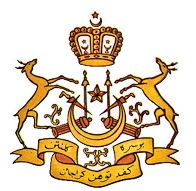
Sultan Muhammad II ibni al-Marhum Tengku Temenggong Long Tan bin Raja Long Yunus ist Sultan (سلطان) von Kelantan (كلنتن)
Abb.: Lage von Kelantan (كلنتن)
[Bildquelle: Constables Hand Atlas of India, 1893. -- Pl. 59]
"Sultan Muhammad II ibni al-Marhum Tengku Temenggong Long Tan bin Raja Long Yunus [Sultan Mulut Merah] As a consequence of dissension within the Royal Family, he was obliged, by virtue of a Siamese compromise, to share power with his uncle, Tengku Long Zainal Abidin. The latter styled Yang di-Pertuan Muda and Muhammad Yang di-Pertuan Besar. Recognised as ruler by the King of Siam and raised to the title of Phaya Visit Bakdiya 1836, and prom. to Phraya Deva Kelantan 1845. Raised to the title of Phraya Devanujitha Mahesvara Rajanukula Vibunlaya Bakdiya Sri Sultan Muhammad Rattanathada Mahapaddana Adikara (Phraya Dechanuchitmahitsarajanukulawibunlayaphakdi Seri Sultan Muhammad Rattanathada Mahapathanathikan) by King Rama V of Siam 4 March 1877." [Quelle: http://en.wikipedia.org/wiki/Sultan_of_Kelantan. -- Zugriff am 2015-02-28]
1839 - 1876
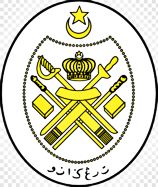
Sultan Omar Riayat Shah Ibni Almarhum Sultan Ahmad Muazzam Shah I, also known as Baginda Omar (1806 - 1876) ist Sultan (سلطان) von Terengganu (ترڠڬانو)
Abb.: Lage von Terengganu (ترڠڬانو)
[Bildquelle: Constables Hand Atlas of India, 1893. -- Pl. 59]
"Sultan Omar Riayat Shah Ibni Almarhum Sultan Ahmad Muazzam Shah I, also known as Baginda Omar, was both the 6th and 9th Sultan of Terengganu, having ascended to the throne twice, first in 1831 and again from 1839 to 1876. Baginda means "the Fortunate" but in its actual use in Malay history is better translated as "the Conqueror". Baginda Omar was born in 1806. He first ascended to become joint Sultan of Terengganu with Sultan Mansur Shah II. However this joint rule would last less than one year before he was overthrown by Mansur Shah II. In 1833, he was banished to Daik by Mansur II.
He again rose to power in 1839 by overthrowing his cousin Sultan Muhammad. He supported Mahmud Muzaffar Shah in his attempt to take control of Pahang (ڤهڠ)."
[Quelle: http://en.wikipedia.org/wiki/Baginda_Omar. -- Zugriff am 2015-02-28]
1839


Es erscheint:
Malcom, Howard <1799 - 1879>:
Abb.: Missionsstation der US-Baptisten, Bangkok
[a.a.O., Bd. 2, S. 134]
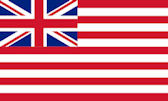
Abb.: Political relations of the East India Company
[a.a.O., Bd. 2, S. 289f.]
1839
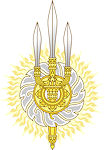
Aufhebung des königlichen Monopols auf den Handel mit dem Holz von Caesalpinia sappan L.
1839

Einführen des königlichen Monopols auf den Handel mit Zucker.
Abb.: Zuckerproduktion 1822 - 1846 (in Tonnen)
[Datenquelle: Cushman, Jennifer Wayne <1944 - >: Fields from the sea : Chinese junk trade with Siam during the late eighteenth and early nineteenth centuries. -- Ithaca : Southeast Asia Program, Cornell Univ., 1993. -- 206 S. ; 26 cm. -- ISBN 0877277117. -- Zugl.: Cornell Univ., Diss 1993. -- S. 81, Anm. 36]
1839

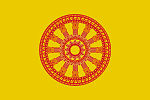
Fertigstellung von Wat Thepthidaram (วัดเทพธิดารามวรวิหาร).
Abb.: Lage von Wat Thepthidaram (วัดเทพธิดารามวรวิหาร)
[Bildquelle: OpenStreetMap. -- Creative Commons Lizenz (Namensnennung, share alike)]
Abb.: Luang Phor Khao (หลวงพ่อขาว), Wat Thepthidaram (วัดเทพธิดารามวรวิหาร), 2006
[Bildquelle: Heinrich Damm / Wikimedia. -- GNU FDLicense]
"Der Wat Thepthidaram (Thai วัดเทพธิดาราม, Tempel der Engelstochter, vollständiger Name: Wat Thepthidaram Woraviharn - วัดเทพธิดารามวรวิหาร) ist eine buddhistische Tempelanlage (Wat) im inneren Bereich der Rattanakosin-Insel (กรุงรัตนโกสินทร์) in Bangkok. Die Anlage wurde zwischen 1836 und 1839 von König Rama III. zu Ehren seiner ältesten Lieblings-Tochter Vilas (voller Name: Krommamuen Apsorn Sudathep, กรมหมื่นอัปสรสุดาเทพ) errichtet. Wat Thepthidaram ist ein Königlicher Tempel Dritter Klasse (พระอารามหลวง ชั้นตรี) .
LageDer Tempel liegt im Bezirk Phra Nakhon (พระนคร), am östlichen Rand der historischen Rattanakosin-Insel. Er liegt direkt südlich des Wat Ratchanaddaram (วัดราชนัดดาราม) und südwestlich des Wat Saket (วัดสระเกศราชวรมหาวิหาร), dessen „Goldener Berg“ (Phu Khao Thong - ภูเขาทอง) weithin sichtbar ist. Vor dem Tempel führt die Mahachai Road direkt an den Überresten der alten Stadtmauer vorbei.
GeschichteObwohl König Rama III. bereits mehrere Tempel in Bangkok restauriert hatte, so war Wat Thepthidaram der erste Neubau seiner Regierungszeit. Der Bau im damaligen Bezirk Suan Luang Phraya Krai (สวนหลวงพระยาไกร) am Samran-Rat-Tor (ประตู สำราญราษฎร์) wurde vom Bauleiter Prinz Laddawan überwacht. Dieser Ort war insofern bemerkenswert, als es zu jener Zeit ein Transport-Zentrum für die östliche Rattanakosin-Insel darstellte: direkt nördlich verlief ein Verbindungs-Kanal (Khlong - คลอง), der heute Khlong Wat Thepthidaram genannt wird. Er verbindet den inneren Stadtbefestigungs-Kanal, den Khlong Lord mit dem Khlong Robb Krung (wörtlich: „Kanal, der die ganze Stadt umschließt“). Über den Khlong Maha Nak (คลองมหานาค) bestand so eine direkte Verbindung vom Königspalast zu den östlichen Landesteilen Siams. Als der Tempel 1893 fertiggestellt worden war, knüpfte während der Eröffnungs-Zeremonie der König persönlich das zeremonielle Band rund um den Tempel und verlieh ihm offiziell die Landrechte.
ArchitekturGemäß der Tradition ist das Tempelgelände streng in zwei Bereiche getrennt, die westliche Hälfte belegt der Sanghawat, der Wohnbereich der Mönche. Die östliche Hälfte heißt Putthawat, hier befinden sich die dem Buddha geweihten Gebäude, der Ubosot (พระอุโบสถ), ein Viharn (วิหาร) und ein Sala Kan Parian (Studier-Halle) (ศาลาการเปรียญ). Jedes Gebäude ist streng west-östlich ausgerichtet und ist von einer eigenen Mauer (Kampheng Kaeo) (กำแพงแก้ว) umgeben, „gekrönte“ Tore bieten Zugang zwischen den einzelnen Gebäuden.
Der zu jener Zeit vom König bevorzugte chinesisch beeinflusste Baustil bekam sogar einen eigenen Namen: Silpa Phra Ratscha Niyom (ศิลปะพระราชนิยม - „vom König bevorzugte Kunst“).
Weitere Sehenswürdigkeiten
Der Ubosot zeigt den charakteristischen thai-chinesischen Baustil jener Periode, die Giebel sind mit chinesischem Porzellan dekoriert. An den vier Eckpunkten des Vorhofs um den Ubosot befinden sich mittelhohe Prangs (ปรางค์), deren Sockel mit kleinen Bogengängen umgeben sind. Die Haupt-Buddhastatue im Innern im Ubosot ist die Statue Luang Phor Khao (หลวงพ่อขาว, nicht zu verwechseln mit zahlreichen anderen Statuen gleichen Namens, auch: Phra Puttha Devavilasa) aus weißem Marmor im Chiang Saen-Stil (เชียงแสน). Er ist über beide Knie gemessen 14 Niu (Thai: นิ้ว) breit und 20 Niu hoch − umgerechnet 28 cm breit und 40 cm hoch (siehe auch: Alte Maße und Gewichte).
Der Viharn ist in ähnlichem Stil wie der Ubosot erbaut, im Vorhof stehen 14 Chedis (เจดีย์) in regelmäßigen Abständen. Im Innern befinden sich 43 Statuen kniender Bhikkhunis (ภิกฺขุณี) welche aus Nak, einer typisch thailändischen Zinn-Kupfer-Legierung gegossen wurden.
Innerhalb des Tempelbereichs sind viele Steinskulpturen aufgestellt. Sie sind in einem einzigartigen chinesischen Stil hergestellt, sie wurden als Ballast der alten Handelsschiffe aus China mitgebracht.
Die Kutis (กุฎิ) im Wohnbereich der Mönche wurden ebenfalls von Künstlern aus der Rama-III.-Periode erbaut. Jedes Gebäude ist einzigartig. Bekannt ist Wat Theptidaram durch den längeren Aufenthalt des thailändischen Nationaldichters Sunthorn Phu (สุนทรภู่, 1786 - 1855), der hier zwischen 1839 und 1842 als Mönch gelebt hat. Seine Kuti ist heute zu einem Museum geworden.
In neuerer Zeit versucht das Kloster mit seinem Abt Phra Ratworamithi die klassische thailändische Pi-Phat-Musik (ปี่พาทย์) sowie die religiös motivierte Tempelmusik Siang Phat wiederzubeleben und zur regelmäßigen Aufführung zu bringen."
[Quelle: http://de.wikipedia.org/wiki/Wat_Thepthidaram. -- Zugriff am 2013-06-24]
1839
Strenges Vorgehen gegen den Opiumhandel:
Abb.: Proa's, Sarawak, 1845 / von James Hunt
[Bildquelle: Wikimedia. -- Public domain]
"From one of the letters, we quote the following on the subject of opium. " His majesty has lately issued a new edict against the introduction and use of opium in this kingdom, and requested the use of our press to print it. We have printed at his expense, and according to his request, 10,000 copies. The immediate cause of this new edict was the following. Three large boats or proas loaded with opium from Singapore, armed and containing about 30 Chinamen each, were heard to be selling it at out places on the Gulf. The Siamese hearing this sent to take them; the smugglers fired upon the Siamese, who returned the fire, and killed 7 men, and took one of the boats. On investigating the matter, the king found a great number of his subjects were connected in purchasing opium. About the same time a number of junks recently from China had full cargoes of opium. Officers were sent into every town and village to investigate the subject. His majesty issued his edict, in which he offered pardon to those who had opium, on condition they would deliver it up to be burned, and threatened death to all who should hereafter either buy or use it. For nearly two months, his officers have been scouring the country, and numbers have been thrown into prison for endeavoring to secrete the drug. The king seems determined to free His country of this drug, at all hazards. We pity the poor creatures who have been accustomed to use it, but cannot but rejoice at the prospect of the removal of so great an evil. His majesty, however, has permitted a very small quantity to be restored to those who cannot break off the use of it immediately, but gives them to understand, that when it is gone they are to have no more for ever. Two or three ships from Singapore, &c. happening to come up at the time having, as was said, opium were obliged to secrete it and take it back. The opium business is not yet completed; new discoveries are daily made, and for a number of days past, it is said the burning of the precious drug has gone on at a great rate.""
[Quelle: The Chinese repository <Canton>. -- Vol. VIII. (May 1839 - April 1840). -- S. 384.]
1839

Offener Brief (veröffentlicht in Kanton - 廣州) von Lin Zexu (林則徐, 1785 - 1850) an Her Majesty Victoria, by the Grace of God, of the United Kingdom of Great Britain and Ireland Queen, Defender of the Faith über den Opiumhandel:
"Lin [林], high imperial commissioner, a president of the Board of War, viceroy of the two Keäng provinces, &c., Tang, a president of the Board of War, viceroy of the two Kwang provinces, &c., and E., a vice-president of the Board of War, lieut.-governor of Kwangtung, &c., hereby conjointly address this public dispatch to the queen of England for the purpose of giving her clear and distinct information (on the state of affairs) &c. It is only our high and mighty emperor, who alike supports and cherishes those of the Inner Land, and those from beyond the seas-who looks upon all mankind with equal benevolence---who, if a source of profit exists anywhere, diffuses it over the whole world---who, if the tree of evil takes root anywhere, plucks it up for the benefit of all nations;---who, in a word, hath implanted in his breast that heart (by which beneficent nature herself) governs the heavens and the earth! You, the queen of your honorable nation, sit upon a throne occupied through successive generations by predecessors, all of whom have been styled respectful and obedient. Looking over the public documents accompanying the tribute sent (by your predecessors) on various occasions, we find the following: "All the people of my country, arriving at the Central Land for purposes of trade, have to feel grateful to the great emperor for the most perfect justice, for the kindest treatment," and other words to that effect. Delighted did we feel that the kings of your honorable nation so clearly understood the great principles of propriety, and were so deeply grateful for the heavenly goodness (of our emperor):---therefore, it was that we of the heavenly dynasty nourished and cherished your people from afar, and bestowed upon them redoubled proofs of our urbanity and kindness. It is merely from these circumstances, that your country---deriving immense advantage from its commercial intercourse with us, which has endured now two hundred years---has become the rich and flourishing kingdom that it is said to be!
But, during the commercial intercourse which has existed so long, among the numerous foreign merchants resorting hither, are wheat and tares, good and bad; and of these latter are some, who, by means of introducing opium by stealth, have seduced our Chinese people, and caused every province of the land to overflow with that poison. These then know merely to advantage themselves, they care not about injuring others! This is a principle which heaven's Providence repugnates; and which mankind conjointly look upon with abhorrence! Moreover, the great emperor hearing of it, actually quivered with indignation, and especially dispatched me, the commissioner, to Canton, that in conjunction with the viceroy and lieut.-governor of the province, means might be taken for its suppression!
Every native of the Inner Land who sells opium, as also all who smoke it, are alike adjudged to death. Were we then to go back and take up the crimes of the foreigners, who, by selling it for many years have induced dreadful calamity and robbed us of enormous wealth, and punish them with equal severity, our laws could not but award to them absolute annihilation! But, considering that these said foreigners did yet repent of their crime, and with a sincere heart beg for mercy; that they took 20,283 chests of opium piled up in their store-ships, and through Elliot, the superintendent of the trade of your said country, petitioned that they might be delivered up to us, when the same were all utterly destroyed, of which we, the imperial commissioner and colleagues, made a duly prepared memorial to his majesty;---considering these circumstances, we have happily received a fresh proof of the extraordinary goodness of the great emperor, inasmuch as he who voluntarily comes forward, may yet be deemed a fit subject for mercy, and his crimes be graciously remitted him. But as for him who again knowingly violates the laws, difficult indeed will it be thus to go on repeatedly pardoning! He or they shall alike be doomed to the penalties of the new statute. We presume that you, the sovereign of your honorable nation, on pouring out your heart before the altar of eternal justice, cannot but command all foreigners with the deepest respect to reverence our laws! If we only lay clearly before your eyes, what is profitable and what is destructive, you will then know that the statutes of the heavenly dynasty cannot but be obeyed with fear and trembling!
We find that your country is distant from us about sixty or seventy thousand miles, that your foreign ships come hither striving the one with the other for our trade, and for the simple reason of their strong desire to reap a profit. Now, out of the wealth of our Inner Land, if we take a part to bestow upon foreigners from afar, it follows, that the immense wealth which the said foreigners amass, ought properly speaking to be portion of our own native Chinese people. By what principle of reason then, should these foreigners send in return a poisonous drug, which involves in destruction those very natives of China? Without meaning to say that the foreigners harbor such destructive intentions in their hearts, we yet positively assert that from their inordinate thirst after gain, they are perfectly careless about the injuries they inflict upon us! And such being the case, we should like to ask what has become of that conscience which heaven has implanted in the breasts of all men?
We have heard that in your own country opium is prohibited with the utmost strictness and severity:---this is a strong proof that you know full well how hurtful it is to mankind. Since then you do not permit it to injure your own country, you ought not to have the injurious drug transferred to another country, and above all others, how much less to the Inner Land! Of the products which China exports to your foreign countries, there is not one which is not beneficial to mankind in some shape or other. There are those which serve for food, those which are useful, and those which are calculated for re-sale; but all are beneficial. Has China (we should like to ask) ever yet sent forth a noxious article from its soil? Not to speak of our tea and rhubarb, things which your foreign countries could not exist a single day without, if we of the Central Land were to grudge you what is beneficial, and not to compassionate your wants, then wherewithal could you foreigners manage to exist? And further, as regards your woolens, camlets, and longells, were it not that you get supplied with our native raw silk, you could not get these manufactured! If China were to grudge you those things which yield a profit, how could you foreigners scheme after any profit at all? Our other articles of food, such as sugar, ginger, cinnamon, &c., and our other articles for use, such as silk piece-goods, chinaware, &c., are all so many necessaries of life to you; how can we reckon up their number! On the other hand, the things that come from your foreign countries are only calculated to make presents of, or serve for mere amusement. It is quite the same to us if we have them, or if we have them not. If then these are of no material consequence to us of the Inner Land, what difficulty would there be in prohibiting and shutting our market against them? It is only that our heavenly dynasty most freely permits you to take off her tea, silk, and other commodities, and convey them for consumption everywhere, without the slightest stint or grudge, for no other reason, but that where a profit exists, we wish that it be diffused abroad for the benefit of all the earth!
Your honorable nation takes away the products of our central land, and not only do you thereby obtain food and support for yourselves, but moreover, by re-selling these products to other countries you reap a threefold profit. Now if you would only not sell opium, this threefold profit would be secured to you: how can you possibly consent to forgo it for a drug that is hurtful to men, and an unbridled craving after gain that seems to know no bounds! Let us suppose that foreigners came from another country, and brought opium into England, and seduced the people of your country to smoke it, would not you, the sovereign of the said country, look upon such a procedure with anger, and in your just indignation endeavor to get rid of it? Now we have always heard that your highness possesses a most kind and benevolent heart, surely then you are incapable of doing or causing to be done unto another, that which you should not wish another to do unto you! We have at the same time heard that your ships which come to Canton do each and every of them carry a document granted by your highness' self, on which are written these words "you shall not be permitted to carry contraband goods;" this shows that the laws of your highness are in their origin both distinct and severe, and we can only suppose that because the ships coming here have been very numerous, due attention has not been given to search and examine; and for this reason it is that we now address you this public document, that you may clearly know how stern and severe are the laws of the central dynasty, and most certainly you will cause that they be not again rashly violated!
Moreover, we have heard that in London the metropolis where you dwell, as also in Scotland, Ireland, and other such places, no opium whatever is produced. It is only in sundry parts of your colonial kingdom of Hindostan, such as Bengal, Madras, Bombay, Patna, Malwa, Benares, Malacca, and other places where the very hills are covered with the opium plant, where tanks are made for the preparing of the drug; month by month, and year by year, the volume of the poison increases, its unclean stench ascends upwards, until heaven itself grows angry, and the very gods thereat get indignant! You, the queen of the said honorable nation, ought immediately to have the plant in those parts plucked up by the very root! Cause the land there to be hoed up afresh, sow in its stead the five grains, and if any man dare again to plant in these grounds a single poppy, visit his crime with the most severe punishment. By a truly benevolent system of government such as this, will you indeed reap advantage, and do away with a source of evil. Heaven must support you, and the gods will crown you with felicity! This will get for yourself the blessing of long life, and from this will proceed the security and stability of your descendants!
In reference to the foreign merchants who come to this our central land, the food that they eat, and the dwellings that they abide in, proceed entirely from the goodness of our heavenly dynasty: the profits which they reap, and the fortunes which they amass, have their origin only in that portion of benefit which our heavenly dynasty kindly allots them: and as these pass but little of their time in your country, and the greater part of their time in our's, it is a generally received maxim of old and of modern times, that we should conjointly admonish, and clearly make known the punishment that awaits them.
Suppose the subject of another country were to come to England to trade, he would certainly be required to comply with the laws of England, then how much more does this apply to us of the celestial empire! Now it is a fixed statute of this empire, that any native Chinese who sells opium is punishable with death, and even he who merely smokes it, must not less die. Pause and reflect for a moment: if you foreigners did not bring the opium hither, where should our Chinese people get it to re-sell? It is you foreigners who involve our simple natives in the pit of death, and are they alone to be permitted to escape alive? If so much as one of those deprive one of our people of his life, he must forfeit his life in requital for that which he has taken: how much more does this apply to him who by means of opium destroys his fellow-men? Does the havoc which he commits stop with a single life? Therefore it is that those foreigners who now import opium into the Central Land are condemned to be beheaded and strangled by the new statute, and this explains what we said at the beginning about plucking up the tree of evil, wherever it takes root, for the benefit of all nations.
We further find that during the second month of this present year, the superintendent of your honorable country, Elliot, viewing the law in relation to the prohibiting of opium as excessively severe, duly petitioned us, begging for "an extension of the term already limited, say five months for Hindostan and the different parts of India, and ten for England, after which they would obey and act in conformity with the new statute," and other words to the same effect. Now we, the high commissioner and colleagues, upon making a duly prepared memorial to the great emperor, have to feel grateful for his extraordinary goodness, for his redoubled compassion. Any one who within the next year and a half may by mistake bring opium to this country, if he will but voluntarily come forward, and deliver up the entire quantity, he shall be absolved from all punishment for his crime. If, however, the appointed term shall have expired, and there are still persons who continue to bring it, then such shall be accounted as knowingly violating the laws, and shall most assuredly be put to death! On no account shall we show mercy or clemency! This then may be called truly the extreme of benevolence, and the very perfection of justice!
Our celestial empire rules over ten thousand kingdoms! Most surely do we possess a measure of godlike majesty which ye cannot fathom! Still we cannot bear to slay or exterminate without previous warning, and it is for this reason that we now clearly make known to you the fixed laws of our land. If the foreign merchants of your said honorable nation desire to continue their commercial intercourse, they then must tremblingly obey our recorded statutes, they must cut off for ever the source from which the opium flows, and on no account make an experiment of our laws in their own persons! Let then your highness punish those of your subjects who may be criminal, do not endeavor to screen or conceal them, and thus you will secure peace and quietness to your possessions, thus will you more than ever display a proper sense of respect and obedience, and thus may we unitedly enjoy the common blessings of peace and happiness. What greater joy! What more complete felicity than this!
Let your highness immediately, upon the receipt of this communication, inform us promptly of the state of matters, and of the measure you are pursuing utterly to put a stop to the opium evil. Please let your reply be speedy. Do not on any account make excuses or procrastinate. A most important communication.
P. S. We annex an abstract of the new law, now about to be put in force.
"Any foreigner or foreigners bringing opium to the Central Land, with design to sell the same, the principals shall most assuredly be decapitated, and the accessories strangled; and all property (found on board the same ship) shall be confiscated. The space of a year and a half is granted, within the which, if any one bringing opium by mistake, shall voluntarily step forward and deliver it up, he shall be absolved from all consequences of his crime."
This said imperial edict was received on the 9th day of the 6th month of the 19th year of Taoukwang, at which the period of grace begins, and runs on to the 9th day of the 12th month of the 20th year of Taoukwang, when it is completed."
[Quelle: Chinese Repository, Vol. 8 (February 1840). -- S. 497 - 503]
1839
Battambang (ក្រុងបាត់ដំបង) hat ca. 3.000 Einwohner
Abb.: Lage von Battambang (ក្រុងបាត់ដំបង)
[Bildquelle: Scottish Geographical Magazine, 1886]
1839


US-Baptistenmissionar J. T. Jones reist von Bangkok über Ayutthaya (อยุธยา) nach Phra Phutthabat (พระพุทธบาท).
Abb.: Lage von Phra Phutthabat (พระพุทธบาท)
[Bildquelle: OpenStreetMap. -- Creative Commons Lizenz (Namensnennung, share alike)]
"Somewhere along this stretch [von Ayutthaya (อยุธยา) Richtung Phra Phutthabat (พระพุทธบาท)] of river Jones stopped to examine a paper factory where paper was made from the bark of the kho 'i [ข่อย, Streblus asper Lour.], a shrub or small tree traditionally used for this purpose. The bark was beaten to pulp, soaked in water and then poured into a rectangular mould of about fourteen by twenty inches. On the bottom of this box a piece of coarse cloth served as a strainer; the moulds with pulp were exposed to the sun until dry. The resulting paper could not be written upon with ink, as the ink would spread; instead a steatite pencil or soft stone had to be used." [Quelle: Terwiel, Barend Jan <1941 - >: Through travellers' eyes : an approach to early nineteenth century Thai history. -- Bangkok : Duang Kamol, 1989. -- S. 131f.]
1839
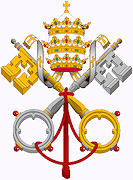
In Chantaburi (จันทบุรี) gibt es ca. 1000 Katholiken, vorwiegend Vietnamesen.
Abb.: Lage von Chantaburi (จันทบุรี)
[Bildquelle: OpenStreetMap. -- Creative Commons Lizenz (Namensnennung, share alike)]
1839

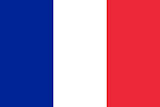
Es erscheint
Pallegoix, Jean-Baptiste <1805 - 1862>: Khum khit christang ou Le catéchisme. -- Bangkok 1839
1839

Es erscheint:
Low, James <1791 - 1852>: On Siamese literature. -- In: In: Asiatic Researches or, Transactions of the Society instituted in Bengal for enquiring into the history and antiquities, the arts, sciences and literature of Asia <Calcutta and London>. -- Vol. 20,2 (1839). -- Nachdruck von part I in: Journal of the Siam Society. -- 95 (2007). -- S. 162 - 197
"The late Dr. [George] Finlayson [1790 – 1823] who accompanied Mr. Crawfurd’s mission to Siam very correctly observes that the vocal music of the Siamese is plaintive and the instrumental lively, playful, soft and sweet. . . . Mr. []John Crawfurd [1783 – 1868] I believe has observed that Siamese music is pitched on a key unknown to barbarous nations (sic). . . . The music would be very pleasing were one or two of the wind instruments laid aside, especially the pi chanai [ปี่ไฉน], a harsh sort of hautboy. The Sticcado, composed of a number of metallic bowls disposed on a circular frame of bamboo which are beaten by a muffled stick, is an instrument of considerable compass." [a.a.O, S. 333—392 passim. -- Zitiert in: Morton, David <1920 - 2004>: The traditional Music of Thailand. -- Berkeley : University of California Press, 1976. -- 258 S. : Ill. ; 29 cm. -- ISBN 0-520-01876-1. -- S. 20]
1839

Es erscheint:
Newbold, T. J. (Thomas John) <1807 - 1850>: Political and statistical account of the British settlements in the Straits of Malacca, viz. Pinang, Malacca, and Singapore ; with a history of the Malayan states on the peninsula of Malacca. -- London, J. Murray, 1839. -- 2 Bde. : Ill. ; 23 cm.
Abb.: Titelblatt
"It seems after all that the Lord of the White Elephant (Siam) has about as much original right [über die malaiischen Staaten] as present power and ancient agggression can give him, and no more." [a.a.o., Bd. II, S. 7]
1839 - 1842-08-29


Erster Opiumkrieg zwischen Großbritannien und dem Kaiserreich China zwingt China zur Öffnung seiner Märkte und zur Duldung des Opiumhandels.
Abb.: Verlauf des Ersten Opiumkriegs
[Bildquelle: Shizhao / Wikimedia. -- GNU FDLIcense]
Abb.: Briten nehmen die Festung Amoy (heute: Xiamen - 廈門市) ein, 1841-08-26 / von Michael Angelo Hayes (artist), James Henry Lynch (lithographer)
[Bildquelle: Wikipedia. -- Public domain]
"Die Eröffnung des Landes für den Handelsverkehr erzwangen die Engländer durch den sogen. Opiumkrieg 1840–42. Die Ostindische Kompagnie allein hatte von den am Ende des 17. Jahrh. gewährten Handelsrechten dauernden Gebrauch gemacht; sie genoss bis 1834 in Kanton ein Handelsmonopol; Tee war der Hauptexportartikel, Opium der immer mehr begehrte Einfuhrartikel. Als nun dieser Handel allen britischen Untertanen freigegeben wurde, stieg die Einfuhr und besonders der Schmuggelhandel in diesem gefährlichen Artikel so schnell, daß die chinesische Regierung die Einfuhr völlig verbot. Durch Bestechung der Mandarinen wurde dies Verbot umgangen, bis ein energischer Spezialkommissar zur Unterdrückung des Opiumhandels in Kanton erschien. Diesem, namens Lin, wurden 4. Mai 1839 auf Befehl des englischen Superintendenten des Handels, Kapitän Elliot, 20,283 Kisten Opium zur Vernichtung übergeben. Als aber die nach Macao und Hongkong geflüchteten Kaufleute auf Lins Wunsch nach Kanton zurückgekehrt waren, wurden sie, weil sie sich nicht unter chinesisches Gesetz stellen wollten, verbannt. Das Geschwader chinesischer Kriegsdschunken, das die beiden englischen Kriegsschiffe Volage und Hyacinth angriff, wurde 3. Nov. 1839 völlig zerstört. Jetzt machte die englische Regierung Ernst. 1841 wurde Kanton blockiert, eine der Chusaninseln besetzt, Amoy erobert, Ningpo okkupiert und Wusung und Schanghai genommen. Als sich die Flotte anschickte, Nanking zu beschießen, lenkte der Kaiser ein und schloß 29. Aug. 1842 mit den Engländern einen Friedensvertrag, worin er sich verpflichtete, in 3 Jahren 21 Mill. Doll. zu bezahlen, die Häfen Kanton, Amoy, Futschou, Ningpo und Schanghai dem britischen Handel zu öffnen, britische Konsularagenten daselbst zuzulassen und feste und billige Tarife der Ein- und Ausgangszölle sowie auch die Transitzölle für das innere Land festzusetzen. Die Insel Hongkong wurde für alle Zeit an England abgetreten und die Inseln Tschouschan und Kolangfu ihnen als Pfand überlassen. Die fünf Häfen eröffnete C. nicht bloß dem Handel der Engländer, sondern aller Nationen und schloß 3. Juli 1841 mit den Vereinigten Staaten von Amerika sowie 23. Okt. 1841 mit Frankreich einen Handelsvertrag ab, der beiden Nationen dieselben Zugeständnisse einräumte wie den Engländern. Ein Artikel des französischen Vertrags bestimmte, daß allen Missionaren überall in C. die Ausübung ihrer Tätigkeit und Grunderwerb, allen Chinesen aber die Annahme des Christentums gestattet sein solle. Dieser Toleranzartikel führte zu vielen Reibereien und wurde von den chinesischen Beamten vielfach gar nicht beachtet, wenn Missionare ihren Schutz gegen die Beleidigungen seitens des Pöbels anriefen. In Kanton wagte die Regierung nicht, die versprochene Zulassung der Fremden zu genehmigen, da die Bevölkerung zu erbittert war." [Quelle: Meyers großes Konversations-Lexikon. -- DVD-ROM-Ausg. Faksimile und Volltext der 6. Aufl. 1905-1909. -- Berlin : Directmedia Publ. --2003. -- 1 DVD-ROM. -- (Digitale Bibliothek ; 100). -- ISBN 3-89853-200-3. -- s.v. China]
Während des Opiumkriegs ruft Rama III all seine Dschunken aus China zurück und befiehlt ihnen, in Siam vor Anker zu bleiben.
1839

Es erscheint:
O'Shaughnessy, William Brooke <1809 - 1889>: Case of Tetanus, cured by a preparation of hemp (the Cannabis indica.),. -- In: Transactions of the Medical and Physical Society of Bengal. -- 8 (1838-40). -- S. 462-469
Es ist eine der ersten westlichen Abhandlungen über den Nutzen von Cannabis (Marijuana, Ganja, กัญชา) in der Medizin.
1839

Der US-Chemiker Charles Goodyear entdeckt ein Verfahren zum Vulkanisieren von Kautschuk. Damit wird der von Natur aus zäh-klebrige Kautschuk in einen dauerelastischen Zustand verwandelt. Beginn der industriellen Nutzbarkeit von Kautschuk.
Abb.: Vulkanisierter Kautschuk
[Bildquelle: Hardballhock / Wikipedia. -- Public domain]
Abb.: Naturkautschuk, Malaysia, 2011
Bildquelle: CEphoto, Uwe Aranas / Wikimedia. -- Creative Commons Lizenz (Namensnennung, share alike)]
1839-01 - 1839-04


Der US-Baptistenmissionar Dan Beach Bradley (1804 - 1873) varioliert / inoculiert über 10.000 Personen gegen Pocken, vornehmlich im Palast und Adlige. Als Anerkennung erhält er von Rama III. 240 Baht.
“Inoculation in Siam. There was once a very extraordinary waking up of the Siamese mind to do something to modify the virulence of small pox. It took place in the latter part of A. D. 1838. That annual scourge was unusually widespread and malignant at that time. Great efforts had been made by the missionaries every year for the four previous years to introduce vaccination, but all in vain. Being surrounded by the small pox, with scarcely any hope of shutting it out from their own families, they then felt constrained, by the providence of God, to endeavour to save their children by inoculating them with the small pox. The blessing of the Lord made it a complete success, every one of the subjects of the experiment having taken the modified small pox in the mildest form. His late Majesty the King of Siam, being informed of it, sent a body of the Royal medical faculty to the missionary physician to enquire into the matter, and then make to him a full report of their investigations. It was a very novel and exciting event for those early years of Protestant Missions, to be visited by such a Committee, from such a monarch. Those servants of the king were very particular and thorough in their enquiries, for they had a great charge in hand, and a stern master to serve.
About that time, there was issued, from the Press of the A.B.C.F.M. [American Board of Commissioners for Foreign Missions] in this city, a little tract in the Siamese language, setting forth the advantages of inoculating for small pox over having it the natural way, and the wisdom of the former course when the scourge is pressing fearfully upon one, and it is impossible to obtain the vaccine virus. A copy of this was sent to the king, and it was eagerly sought for and read by princes, lords, and the commoners! Presently ten or twelve royal physicians were ordered by the king to visit the missionary physician daily, for the purpose of seeing his practice in inoculating and treating the small pox thus modified and divested of its virulence, and in this way to qualify themselves for inoculating in the royal palace. Having faithfully studied the art a few days with praiseworthy proficiency, they were armed with lancets, and required to inoculate all that were unprotected in the palace of the king, and in the palaces of the princes, and in the families of the nobles and lords, and other officers of government, in the city and our, of the city. Other native doctors were encouraged by the king to follow this royal example, who extended the work, it is believed, into many of the provinces of Siam.
Inoculation was then the engrossing business and care, not only of nearly all the native physicians, but also of a large proportion of the better classes of the people, from the beginning of the year 1839 until the month of April. It is impossible to estimate the many thousands that were within that period inoculated; and it is very remarkable that amongst them all, there was not, probably, more than one case in five hundred that proved fatal, until the hot season was ushered in, when the work became so much less successful, that it was suspended.
The king then evinced his high appreciation of the blessings of inoculation by presenting to each of the royal physicians, who had labored in the work, a purse of silver varying from eight to four hundred ticals, and to the missionary physician a purse of two hundred and forty ticals.
So generally was inoculation accounted a perfect success, that, those who had been waked up and blessed by it, wished for nothing better to take its place; and consequently it became subsequently an obstacle to the introduction of vaccination; because it was regarded as almost as safe, and always a more certain protection against small pox in the natural way, than vaccination.
Inoculation was not without its dangers, however, and when vaccination came into vogue, inoculation was abandoned for a safe method of prevention.”
[Dan Beach Bradley (1804 - 1873) schreibt im Bangkok Calendar 1865. -- Zitiert in: Highet, H. Campbell: Small pox, vaccination and the new vaccination law in Siam. -- In: Journal of the Siam Society. -- 11,1 (1914/15). -- S. 17 - 19]
Abb.: Unterschied der Variolation (mit abgeschwächten Pocken) (links) und Impfung (mit Kuhpocken) (rechts), 1802
[Bildquelle: Wellcome Images. -- Creative Commons Lizenz (Namensnennung)]
"Die Variolation (auch veraltet Inoculierung) ist eine Technik der Impfung gegen Viruserkrankungen, die bis ins 18. Jahrhundert meist bei Menschen vor allem in China, aber auch im Nahen Osten eingesetzt wurde. Hierbei wurden Virenkollektiva aus den Wunden von Pockenkranken genutzt, die die Krankheit überstanden hatten. Gesunden Personen wurden kleine Wunden beigebracht, in welche die attenuierten (abgeschwächten) Viren appliziert wurden. Es wurde also ein attenuierter Lebendimpfstoff verwendet. Durch die Vermehrung der Viren sollte die Immunreaktion ausgelöst werden. Allerdings konnten die Viren durch Rück-Mutation bei ihrer Vermehrung wieder krankheitsauslösend werden, was zu einer relativ hohen Todesrate unter den derart Behandelten führte. Immerhin war aber damals die Sterblichkeit bei dieser Behandlung geringer als nach Infektion ohne vorausgegangene Variolation. [1] [2]
Das Wissen über die Variolation wurde von Lady Mary Wortley Montagu etwa 1720 aus der Türkei nach England überliefert und dort im 18. Jahrhundert angewandt und verfeinert. Der englische Arzt Thomas Dimsdale impfte Katharina die Große und ihre Söhne und Enkel mit dieser Methode und wurde deshalb zum Baron ernannt. Ab 1800 wurde die Variolation zunehmend durch Edward Jenners Vakzination ersetzt."
[Quelle: http://de.wikipedia.org/wiki/Variolation. -- Zugriff am 2015-05-07]
1839-01-01

Strafexpedition der US Navy gegen Sumatra (Second Sumatran Expedition), da 1838-08 die Mannschaft des US-Handelsschiffs Eclipse von Malaien getötet worden war.
"The expedition arrived off southern Sumatra on 1 January 1839. The two American vessels first headed for Quallah Battoo. Once they had arrived, the two U.S. Navy vessels formed a line of battle just in range of five earth and wooden forts that protected the village and opened fire. Over an hour later all of the forts were destroyed or in shambles. The chief of the village surrendered and agreed never again to attack American ships. With this Commodore Read set sail for Muckie, the next American objective. Columbia and John Adams arrived off Muckie the following day. The Americans landed a force of 360 officers, marines and sailors, all under the command of Commander T.W. Wyman of the navy. Wyman's men attacked Muckie, while Columbia and John Adams provided covering fire with their cannon. Although most of the inhabitants fled their village upon the outbreak of fighting, some of the Malay men attempted to resist the attack but were overwhelmed. Within a short time Muckie was in flames. The landing party then returned to their ships and sailed away. The punitive expedition ended after the Muckie engagement and Commodore Read continued his cruise around the world. The second Sumatran expedition achieved what the first expedition had not. Never again did Malays plunder an American merchant ship. Casualties are absent from records." [Quelle: http://en.wikipedia.org/wiki/Second_Sumatran_expedition. -- Zugriff am 2013-06-15]
1839-03-18

China verbietet unter Androhung der Todesstrafe die Einfuhr von Opium.
1839-03-20
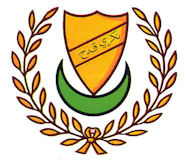
Die seit 1838 andauernde Rebellion des Sultans von Kedah (قدح) ist von Siam niedergeschlagen. Kedah wird in drei Vasallenstaaten aufgeteilt:
- Kedah (قدح) (ไทรบุรี)
- Kubang Pasu (กุบังปาสู)
- Palit (ปะลิส = Perlis - ﭬﺮليس)
Siam beendet die direkte Herrschaft über Kedah (قدح). Kedah wird bis 1842 von malaiischen Gouverneuren verwaltet, die zu Siam loyal sind.
Abb.: Lage von Kedah (قدح)
[Bildquelle: Constables Hand Atlas of India, 1893. -- Pl. 59]
1839-03-22
Schweres Erdbeben. Panik.
1839-03-22

Schwere Erdbeben in Ava (Inwa, အင်းဝ), der Hauptstadt Burmas. Die ganze Stadt wird zerstört. Sie wird nicht wieder aufgebaut, sondern Amarapura (အမရပူရ) wieder als neue Hauptstadt gewählt. Die neue Hauptstadt wird 1842-02 bezogen.
Abb.: Lage von Ava (Inwa, အင်းဝ) und Amarapura (အမရပူရ)
[Bildquelle: Bartholomew, J. G. <1860 - 1920>: A literary & historical atlas of Asia. -- London, o. J.]
1839-04
Das Hauptkontingent der siamesischen Marine wird in Songkhla (สงขลา / Singgora - سيڠڬورا) zur Niederhaltung der malaiischen Vasallen stationiert.
Abb.: Lage von Songkhla (สงขลา / Singgora - سيڠڬورا)
[Bildquelle: Bartholomew, J. G. <1860 - 1920>: A literary & historical atlas of Asia. -- London, o. J.]
1839-06

Amerikanische Missionare eröffnen die erste Druckerei in Siam.
1839-08-19

Vor der Akademie der Wissenschaften in Paris wird die Daguerreotypie vorgestellt. Dieses photographische Verfahren hatte seit 1835 der französische Maler Louis Jacques Mandé Daguerre (1787 - 1851) entwickelt. Das Datum gilt als Beginn des Zeitalters der Photographie.
Abb.: Älteste erhaltene Daguerreotypie Daguerres, 1837
[Bildquelle: Wikimedia. -- Public domain]
1839-12 - 1840-03

Es erscheint:
Richardson, David <1796 - 1846>: Journal of a mission from the Supreme Government of India to the court of Siam. -- In: Journal of the Royal Asiatic Society of Bengal. -- 8 (1839). -- S. 1016 -1036 + 9 (1840). -- S. 1-30, 219 - 250.
"January 29th.—Bausong-roy [สองร้อย], 4h. 20m., fourteen miles. Started this morning at 8h. 50m., and marching along a level road, through a thin jungle with long grass, a great deal of which had however been burned, we passed one old plantation of cotton and plantains, the cotton of a kind I have not seen before, being now ready to gather; the crop was small and scanty, but the plants are now two or three years old, the cotton fine and soft, but rather short in the staple. We are now fairly in the alluvial plain at the head of the gulf; saw only one or two small rocky hills to the westward; the water has been scarcer and worse than yesterday, and we were nearly missing this, which is a swamp, as it lies a little off the road, and the people of the few houses near it, who are Talines, or Laos prisoners from Wiang-tchong [Vientiane - ວຽງຈັນ] took fright at our appearance, taking us for Siamese or Taline small officers. It appears that at stated periods, the Talines are branded on the arm, as belonging to the right or left wing of the army, and their name, number, and officer’s company to which they belong, entered in the muster roll of Talines, from which time they are liable to all calls for public duty, those only who have entered the priesthood are excepted ; and such as can escape, by concealing themselves, till the impress is over, do so. One old woman in her joy to find who we were, abused the government of the country roundly (though several Siamese of our thirty conductors were present); she said the Siamese, bad as they were, were not so bad as the low Talines who form the officers in army; she said scarce a day passed without tears for the old country; now it was quiet she prayed daily that her next transmigration might be a bird to return there, as she had no hopes now of doing so in this life. There are now about 5000 Talines, 1500 of whom receive royal pay, such as it is; some as little as three or four tickels [tical = Baht] a year; all who have reached the height of two cubits and a span, are branded, and they arc numerous, as there has been no impress for three years." [Journal of the Royal Asiatic Society of Bengal. -- 9 (1840). -- S. 11f.]
ausführlich: http://www.payer.de/thailandchronik/ressourcen.htm